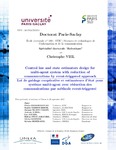Control law and state estimators design for multi-agent system with reduction of communications by event-triggered approach
| dc.contributor.supervisor | Piet-lahanier, H | en |
| dc.contributor.supervisor | Kieffer, M | en |
| dc.contributor.supervisor | Bertrand, S | en |
| dc.contributor.author | Viel, CXS | en |
| dc.date.accessioned | 2018-01-11T09:42:04Z | |
| dc.date.available | 2018-01-11T09:42:04Z | |
| dc.date.issued | 2018-01-31 | en |
| dc.date.submitted | 2017-09-26 | en |
| dc.identifier.uri | http://hdl.handle.net/10026.1/10558 | |
| dc.description.abstract |
A large amount of research work has been recently dedicated to the study of Multi-Agent System and cooperative control. Applications to mobile robots, like unmanned air vehicles (UAVs), satellites, or aircraft have been tackled to insure complex mission such as exploration or surveillance. However, cooperative tasking requires communication between agents, and for a large number of agents, the number of communication exchanges may lead to network saturation, increased delays or loss of transferred packets, from the interest in reducing them. In event-triggered strategy, a communication is broadcast when a condition, based on chosen parameters and some threshold, is fulfilled. The main difficulty consists in determining the communication triggering condition (CTC) that will ensure the completion of the task assigned to the MAS. In a distributed strategy, each agent maintains an estimate value of others agents state to replace missing information due to limited communication. This thesis focuses on the development of distributed control laws and estimators for multi-agent system to limit the number of communication by using event-triggered strategy in the presence of perturbation with two main topics, i.e. consensus and formation control. The first part addresses the problem of distributed event-triggered communications for consensus of a multi-agent system with both general linear dynamics and state perturbations. To decrease the amount of required communications, an accurate estimator of the agent states is introduced, coupled with an estimator of the estimation error, and adaptation of communication protocol. By taking into account the control input of the agents, the proposed estimator allows to obtain a consensus with fewer communications than those obtained by a reference method. The second part proposes a strategy to reduce the number of communications for displacement-based formation control while following a desired reference trajectory. Agent dynamics are described by Euler-Lagrange models with perturbations and uncertainties on the model parameters. Several estimator structures are proposed to rebuilt missing information. The proposed distributed communication triggering condition accounts for inter-agent displacements and the relative discrepancy between actual and estimated agent states. A single a priori trajectory has to be evaluated to follow the desired path. Effect of state perturbations on the formation and on the communications are analyzed. Finally, the proposed methods have been adapted to consider packet dropouts and communication delays. For both types | en |
| dc.language.iso | en | en |
| dc.subject | event-triggered | en |
| dc.subject | Multi-Agent-System | en |
| dc.subject | formation | en |
| dc.subject | consensus | en |
| dc.title | Control law and state estimators design for multi-agent system with reduction of communications by event-triggered approach | en |
| dc.type | Thesis | |
| plymouth.organisational-group | /Plymouth | |
| plymouth.organisational-group | /Plymouth/Faculty of Science and Engineering | |
| rioxxterms.licenseref.uri | http://www.rioxx.net/licenses/all-rights-reserved | en |
| rioxxterms.type | Thesis | en |


